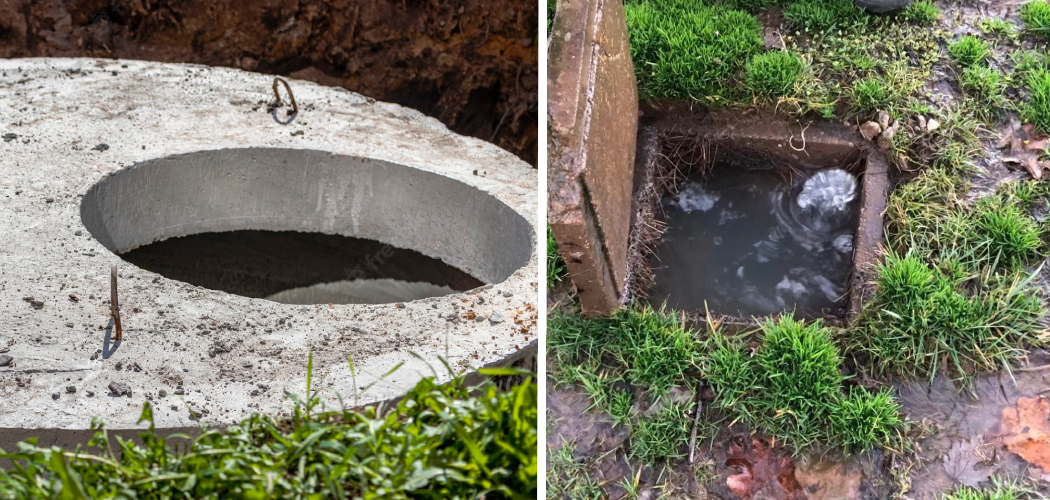If you have a septic tank, it’s important to know how to stop septic tank overflow. Septic tank overflow can occur when the tank is full, or the system is overwhelmed with wastewater. If left untreated, this can cause significant damage to your property and environment.
In this article, we’ll discuss the causes of septic tank overflow and outline some steps you can take to prevent it from happening. We’ll also provide tips on how to keep your septic system running smoothly. So, if you’re struggling with a septic tank overflow, read on for some helpful advice.
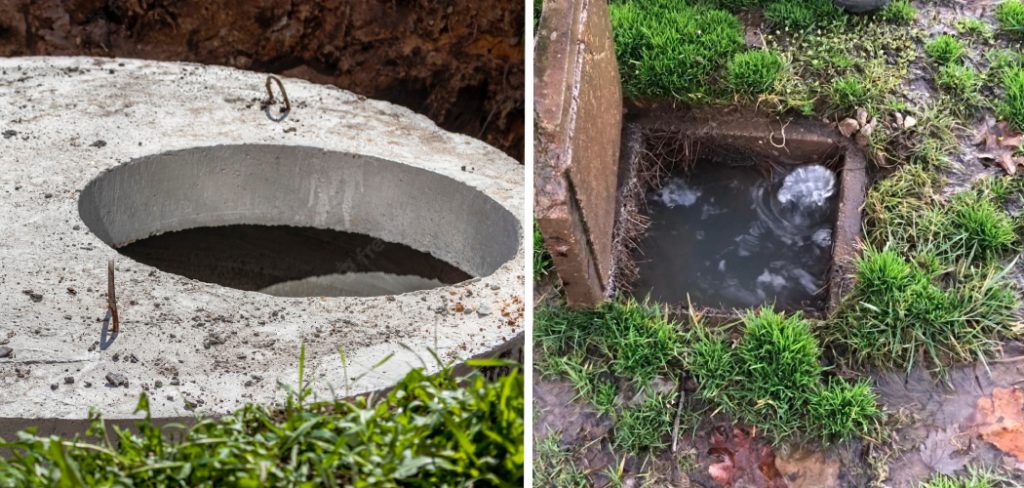
5 Common Reasons That Cause Septic Tank Overflow
1. Excessive Water Use
One of the most common causes of septic tank overflow is excessive water use. When too much water enters the septic tank, it can cause the solid waste to float to the top and eventually overflow. To prevent this from happening, it is important to limit your water usage, especially if you have a small septic tank.
2. Clogged Drains
Another common cause of septic tank overflow is clogged drains. If your drains are clogged, it can cause water to back up and eventually overflow from your septic tank. To prevent this from happening, it is important to keep your drains clean and clear of any debris.
3. Tree Roots
Tree roots can also be a common cause of septic tank overflow. When tree roots grow into your septic tank, they can block the water flow and eventually cause an overflow. To prevent this from happening, it is important to have your septic tank inspected regularly and to have any tree roots removed that are growing into it.
4. Faulty Septic Tank
A faulty septic tank can also be a common cause of overflow. If your septic tank is not functioning properly, it can cause water to back up and eventually overflow. To prevent this from happening, it is important to have your septic tank regularly inspected by a professional.
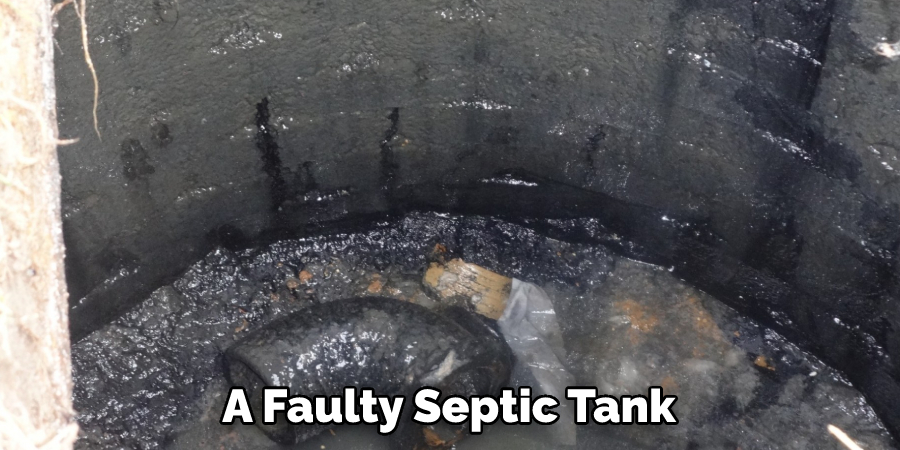
5. Heavy rains
Heavy rains can also be a common cause of septic tank overflow. When it rains heavily, the rainwater can enter the septic tank and cause the solid waste to float to the top and eventually overflow. To avoid this, you can install a septic tank rain diverter. This will help redirect the rainwater away from the septic tank and prevent it from overflowing.
How to Stop Septic Tank Overflow: 7 Smart Ways
1. Pump Your Septic Tank Regularly:
Pumping your septic tank is one of the most important things you can do to prevent overflow. Your septic tank should be pumped every 3-5 years or as needed. Depending on the size of your tank and the number of people in your household, you may need to pump more often. When pumping your septic tank, be sure to pump to the bottom, so you remove all the sludge and scum.
2. Use Water Wisely:
Using water wisely is one of the best ways to prevent septic tank overflow. Don’t let the water run unnecessarily, and don’t use more water than necessary. For example, turn the water off while brushing your teeth, and don’t let the faucet run while you’re doing dishes. Water your plants during the cooler hours of the day, so evaporation isn’t as high. Fix any leaks in your home so water isn’t being wasted.
3. Dispose of Waste Properly:
Waste material can clog up your septic system and cause overflow. Be sure to dispose of all waste properly. Don’t put grease, oil, or chemicals down the drain. These can solidify in your septic tank and clog the system. Don’t flush anything other than toilet paper down the toilet. Diapers, feminine products, and paper towels should all be disposed of in the trash.
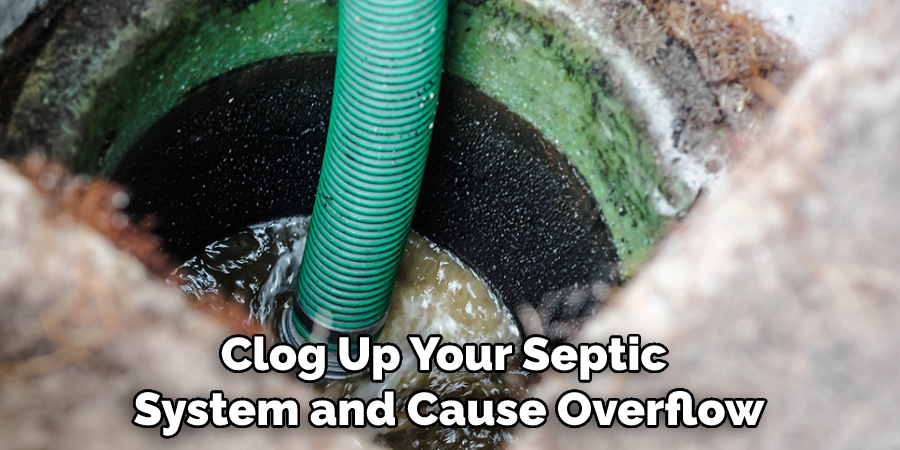
4. Don’t Flush Non-biodegradable Items:
Non-biodegradable items shouldn’t be flushed down the toilet. These items can clog up your septic system and cause overflow. Make sure that your family and visitors know not to flush anything other than toilet paper. If the items are small enough, you can put them in the trash. If they’re too large to flush or put in the trash, you may need to contact a professional to have them removed.
5. Plant Trees and Shrubs Away From System Components.
Trees and shrubs have roots that can grow into and damage your septic system components if they are planted too close to them. To avoid this, plant trees and shrubs at least 10 feet away from your system’s components. Additionally, avoid planting trees with aggressive root systems near your systems, such as willows and maples.
6. Don’t Drive or Park on Your Septic System Components
Driving or parking on your septic system components can damage them and cause them to fail prematurely. Also, driving or parking on your septic tank or leach field can compact the soil, leading to drainage problems. If you must drive or park on your septic system components, spread the weight out as much as possible to avoid damaging them.
7. Inspect Your System Regularly
You should inspect your septic system regularly to ensure it is functioning properly. Look for any signs of damage, such as cracks, leaks, or collapsed leach fields. Also, check for any clogs or blockages in your system. If you notice any problems, be sure to have them repaired as soon as possible. If the problem is left untreated, it could lead to septic tank overflow.
What Happens If you Don’t Stop Septic Tank Overflow?
If you don’t take steps to prevent septic tank overflow, the effluent will eventually back up into your home through the drains. This can cause serious health problems and damage to your home and belongings. In some cases, evacuating your home may even be necessary until the problem can be resolved.
In addition to the physical damage that can be caused by septic tank overflow, there is also the potential for environmental contamination. If the effluent from a septic tank overflows into surface waters, it can pollute drinking water supplies, create health hazards for humans and animals, and degrade water quality. So, it’s important to take steps to prevent septic tank overflow and address any problems that occur promptly.
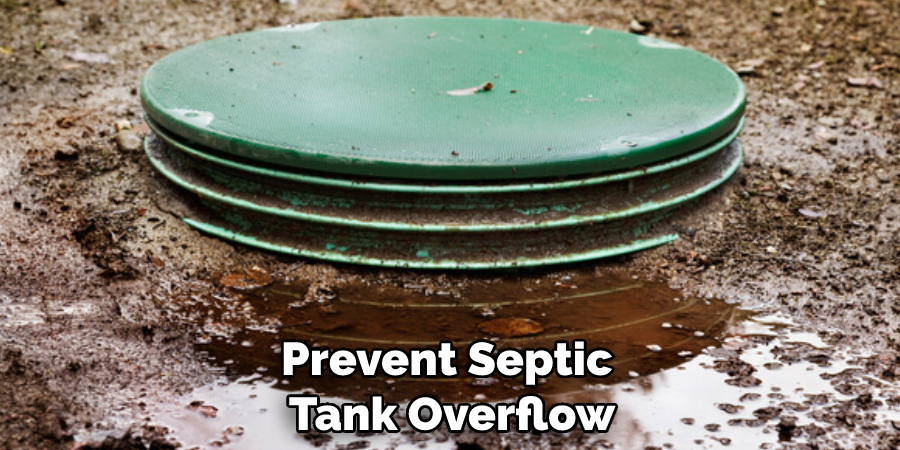
Few Tips to Stop Septic Tank Overflow
- Pumping your septic tank regularly – at least every 3-5 years, or as your local health department recommended.
- Dispose of household chemicals, such as cleaners, bleach, and paint thinners, properly.
- Fixing all leaks in your home – plumbing, fixtures, and appliances.
- Not putting things down your drains that don’t belong there, such as grease, coffee grounds, or Feminine hygiene products.
- Conserving water when possible.
- Educating your family and visitors about what can and cannot go down the drain.
- Have your septic system regularly inspected by a professional.
Following these tips can help stop your septic tank from overflowing and causing costly damage to your home and property.
Why Does My Septic Tank Have Water Around It?
If you have noticed water pooling around your septic tank, it is important to take action to address the problem. A septic tank overflow can lead to serious health and environmental hazards, so it is crucial to understand the causes of this issue and how to prevent it. One common reason for septic tank overflow is a blockage in the tank itself.
This can be caused by a build-up of solid waste, grease, or other materials that prevent wastewater from flowing out of the tank. If you have a blockage in your septic tank, it is important to have it professionally cleaned as soon as possible to avoid an overflow. Another common cause of septic tank overflow is a leak in the tank. If your tank leaks, water can enter and escape, leading to an overflow.
Is It Normal for Septic Tank to Overflow?
It’s normal for septic tanks to overflow during heavy rains or when there is excessive water in the system. Too much water can saturate the soil and cause sewage to come back into your home. If you have a septic tank, it’s important to know how to prevent overflows and what to do if one occurs.
If the overflow is not corrected, it can lead to serious health problems for you and your family. Make sure to have your septic tank regularly inspected to ensure that it is functioning properly.
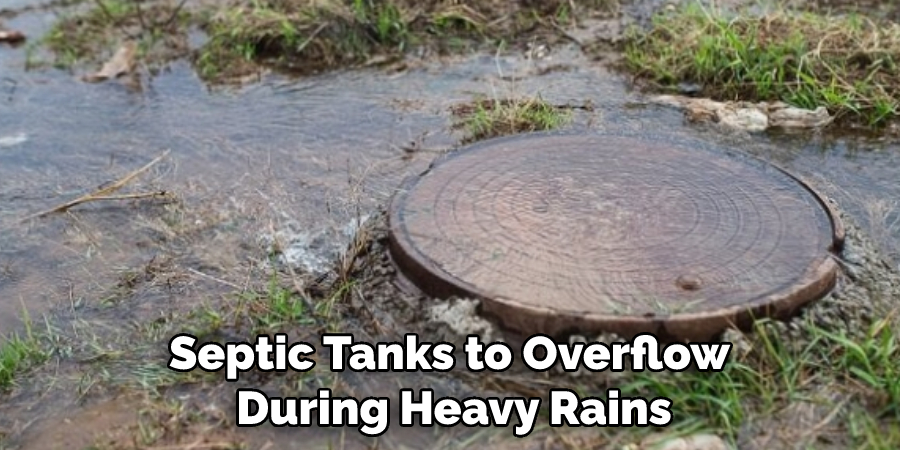
Final Words
Although preventing septic tank overflow may seem daunting, you can take a few simple steps to reduce the risk of an overflowing septic tank. For example, regularly pumping your septic tank and monitoring your water usage can help keep your septic system in good working order and avoid disasters.
So don’t wait until it’s too late – make sure you’re taking care of your septic tank now to avoid any problems down the road. We hope this guide on how to stop septic tank overflow has been helpful. If you’ve any questions or want to know more, feel free to comment below.
You Can Check It Out to Fix a Septic Tank That Backs Up

